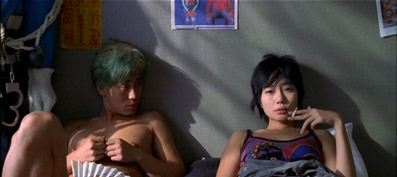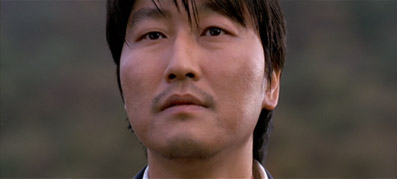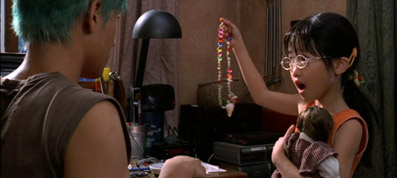|
It's
a rare privilege to be able to go into a movie cold,
without foreknowledge of its plot or characters or even
its genre, to have no preconceptions or expectations and
be able to experience the film purely for what it is.
As someone who has to prepare detailed programme notes
for film society screenings, and who is thus aware
even of the endings of some films before I have seen them,
I especially appreciate that opportunity when, once
in a blue moon, the chance to sidestep advance information presents itself. The counter-argument would suggest that if you
are walking quietly down the road and suddenly get hit
hard in the mouth, you couldn't help wondering if you'd
have taken the blow better if you'd been just a little
prepared for its arrival. But as a title, especially
given the film's Eastern origins, Sympathy for
Mr. Vengeance comes loaded with suggestion,
prompting images of a poster bearing a sweaty young
Korean male in a defensive martial arts pose, a look
of fiery but determined anger on his face, perhaps even
waving a weapon of some sort. Mr. Vengeance takes shit
from nobody. Which, as it turns out, is light years
from the truth.
I first saw Park Chan-wook's extraordinary fourth
feature some time before the Tarantino-led yahooing
over his latest, Oldboy.
All I'd heard was that this was a remarkable work and
the opportunity to see it presented itself and I took
it. I didn't know what to expect, and I'm not sure I
was quite ready for what I got. I was certainly not
prepared for the very disturbing turn the film takes
in its last half hour. Those coming to it retrospectively
after Oldboy may be better prepared
for that, especially if they struggled to make it through
that film's notorious dental torture scene.

But then again, maybe not. Sympathy for Mr.
Vengeance has none of Oldboy's
post-modernist artistic tics or does not share its almost pause-free pacing. Indeed,
Park's style here is deceptively low key, all static
wide shots, lingering close-ups, and unhurried editing. It also has a storyline that
initially borders on the outrageously clichéd,
with good hearted deaf-mute Ryu (Song Kang-ho from Park's Joint Security Area) working long hours
at the factory to pay for his sister's desperately needed
kidney transplant. She can't have one of his kidneys
because he has the wrong blood type, and there is no
sign of a suitable donor on the horizon. Despite his
diligent saving, time is running out, an urgency that
further increases when he is laid off from his job. What's a boy
to do?
It's
here that the film takes its first dramatic narrative
twist and turns its back on any hint of melodrama. In
desperation, Ryu turns to underground organ transplants
as a possible source. It'll cost a lot and he doesn't have the required amount, but the criminals have a solution to this – they'll take one of his kidneys in
part-exchange. Ryu is hopelessly trusting and naive when
dealing with these shiftiest of people, even helping
the gang's aging female matriarch to administer her
addiction-led morphine injection. When he
wakes a few hours later on a concrete floor, naked and minus a kidney,
the gang have fled with both his organ and his money. At
this point a legitimate donor becomes available, but
now Ryu lacks the funds to pay for the transplant. He
needs a lot of money and he needs it fast, and so he
and his soon-to-be-girlfriend Yeong-mi (Bae Du-na from Take Care of My Cat) devise a plan
to kidnap and ransom the daughter of his wealthy ex-employer
Park Dong-jin (the excellent Song Kang-ho from Memories
of Murder). What could possibly go wrong
with a plan like that?
Park's
pace may be sedate but there is a fine economy to his
storytelling that requires the audience to pay
attention to the small details and to sometimes put
the pieces together themselves. Thus, one minute Ryu
and Yeong-mi are watching Dong-jin from their car, convinced
that the plan is doomed, and in the very next shot they
are playing with the abducted child like old relatives
on a picnic. Surprisingly, the child happily resides
with her adoptive new parents (Ryu's sister
knows nothing of the kidnap and believes they are merely
looking after the girl for a friend while her mother
is in hospital), and starts to look as if things will go their way. But events
take unexpected and sometimes tragic turns, twists delivered
so effectively that I caught myself holding my head
and crying, "Oh God, no!" at the screen more
than once on my first viewing. Both Ryu and Dong-jin
suffer at the hands of fate, which leads to a final
half-hour in which both men become determined to seek
revenge on those they believe have so terribly wronged
them, and fate eventually pitches them against each other.

Here
the film becomes an unflinching examination of the gradual collapse of morality in those who have suffered loss at
the hands of others, and the extremes to which ordinary
people can be pushed by grief and anger (a theme also
at the heart of Oldboy). The
emotional complication for the audience is that we sympathise
with both men and their respective predicaments, and
while we want to see Dong-jin get justice, we don't
want Ryu and Yeong-mi to pay the price. In this respect,
we are offered the resolution of vengeance that is key
to so many western revenge thrillers, but not the cathartic
pay-off that this traditionally brings. Sympathy
for Mr. Vengeance takes us to far darker places
than other such films have dared – it's a revenge
story that explores the suffering of
those seeking retribution, but also the moral complications
and emotional pain that this inevitably leads to.
It
is the final act that delivers the film's most
horrific sequences. Although much of the violence is
off screen or distanced by long shot, the sheer brutality
and cold-hearted viciousness with which it is administered
is genuinely shocking, especially given the largely
sedate handling of the drama that has preceded it. This
shift in tone is signposted by a key event early in
the story, when recently fired employee Peng stops
Dong-jin's car and pleads for his job so that he
might support his family, and on failing to convince
his ex-employer he opens his shirt and repeatedly slices
his own stomach. Startling in itself, the incident later
resonates with Dong-jin in a number of ways, notably
through the cut he receives to his hand when trying to
disarm the man, which twice gives him considerable pause
for thought, once when it is mirrored by a second, almost
identical injury. Peng's own eventual fate also provides
Dong-jin with a tenuous emotional connection to his
old life when he seems to have lost everything, and
the stomach slashes foreshadow the opening cut of a
particularly distressing autopsy that Dong-jin will
later attend. This is a scene that has caused considerable
debate amongst those I know who have seen the film –
many (and this initially included myself) thought it
extremely unlikely that any man would be expected or
even allowed to view the grisly autopsy of such a close
young family member, and believed that its principal
purpose – apart from turning the stomachs of the audience
with a series of truly horrible sound effects – was
to provide a comparison for when Dong-jin unemotionally
observes a second autopsy in a later scene. Four viewings
in I found myself with a different take on this, and
it seems likely that this was a conscious decision on
Dong-jin's part to attend and face up to the unimaginable,
and that he was able to gain access to this, as he does
to the investigation itself, by bribing the appropriate
authorities.

The
film as a whole is genuinely overpowering, an emotionally
gut-wrenching and intellectually thrilling work from
one of Korean cinema's fastest rising stars. The
overall sense of bleakness should not obscure the fact
that there is a fair amount of humour contained within,
especially in the earlier scenes, something that becomes
more evident on subsequent viewings. In terms of its
involvement with the characters, its restrained yet
sometimes brutally direct approach and the simple beauty
of its construction, it actually outshines the more
widely heralded Oldboy. Sympathy
for Mr. Vengeance is a superb example of why
modern Korean cinema now appears to be leading the pack.
I
have to admit that the first time I saw the film on
DVD I was convinced that some serious cropping had gone
on here, as if the film was shot in widescreen and then
vertically cropped in post production to scope. I have had to revise
this view after seeing the behind-the-scenes documentary
on this disc, which includes shots of the video monitor
during shooting which repeatedly shows the picture being
framed to 2.35:1 – even the storyboards are drawn in
that ratio. But nagging doubts remain about whether
this picture has been cropped further for video, as although
much of the framing seems fine, a good many shots feel
uncomfortably cramped, and there are a fair few in which
the tops of heads are awkwardly cut off. Elsewhere, only
the lower half of a key poster advertising underground
organ transplants is visible (the subtitles provide
the whole message), and the first knife cut in the aforementioned
autopsy scene starts some way out of the picture area
and drifts diagonally into shot in a way that does not
feel quite right. At times this seems almost clumsy,
and does not sit with the precision of the camera placement
at lighting. But I freely admit I have no real evidence
to back this up and it may just be a decision on the
part of Park and his cinematographer Kim Byeong-il to
shoot it this way – after all, the film breaks enough
other established conventions. It is interesting to
note, however, that Tartan have listed the aspect ratio
on the box as 1.77:1, and the framing here is actually
2.21:1, itself slightly unusual. (See my review of the Vengeance Trilogy Edition for more on this.)
The
good news is that the anamorphic transfer itself is
first rate, with sharpness, detail, contrast and colour
– including the slight green dominance Park wanted for
some scenes – just right. Blacks are rock solid and
the shadow detail is good. There are no distracting
compressing artefacts, and although this is an NTSC-to-PAL
transfer (the running time and occasional motion blurring
are giveaways), it's a damned good one.
There
are three Korean soundtracks available: Dolby 2.0 stereo,
Dolby Digital 5.1 EX and DTS-ES 6.1. All boast fine
clarity and even the humble stereo soundtrack has a
decent range and good separation, but does tend to pale
in comparison with the 5.1 track, which makes use
of the full sound stage and flexes its muscles on the lower
frequencies when needed. But even this takes second
place to the DTS-ES track, a dynamic mix that is both
subtle in its use of environmental and urban atmospherics
and thunderous when reproducing factory noise. Separation
on both the surround mixes is excellent. Due to the
requirements of director's commentary, the audio option
can only be changed in the Setup menu.
The
English subtitles are generally fine, but are lacking in a couple
of key places – notes, documents and computer displays,
some of which are clearly important, are left frustratingly
untranslated.
The
key extra here is the Director's Commentary,
although that should be in the plural as Park Chan-wook
is joined by fellow director Ryu Seung-wan, whose films
include Die Bad [Jukgeona hokeun
nabbeugeona] (2000) and No Blood No Tears [Pido nunmuldo eobshi] (2002), and whose
brother is actor Ryu Seung-beom, a regular in Park's movies,
this one included. This is a very lively and consistently
interesting track in which the two men discuss the effectiveness of
particular sequences, the process of making the film,
the use of music, and even the original intention to structure
the film as two stories and shoot one of them in black
and white. There is also some interesting info on the
numerous cameo appearances in the film, some of which
are surprising, to say the least – the four guys seen
hanging out in the adjacent apartment and collectively
masturbating to what they believe is the sound of sex next door (and
is in fact Ryu's sister groaning in pain) are four up-and-coming short film directors. The pair reference a
number of western films, some of which, such as the Zucker
Brothers' Ruthless People, you would
not have seen a specific connection to had they not
pointed it out. They also express their admiration for
Kitano Takeshi's talent for storytelling through editing.
There is also a fair amount of humour here, some of it
dryly unintentional – commenting on the scene in which
one character digests an internal organ of another, Park
says "I thought it wouldn't make people sick. That
was a misjudgement." There's not a single dull spot
here, and is a very worthy extra. As this is conducted
in Korean with subtitles, it cannot be accessed through
the audio button, but has to be specifically selected
on the Extras menu.
Shot
on 4:3 digital video, the Behind the Scenes
Documentary (29:57), is a largely formless
but always interesting glance at the making of the film,
and includes interviews with key cast members and the
director, rehearsal and research footage (the cast practicing
sign language at a school for the deaf), and some of the
technical aspects of the production.
Finally
there is the original Korean Theatrical Trailer,
which is scope, non anamorphic, and thoughtfully subtitled
in English.
The
expected Tartan Asia Extreme Trailer Reel has trailers
for Oldboy, Battle Royale II, Infernal Affairs, Infernal Affairs
II and A Tale of Two Sisters.
What
can I say? A great film, a decent transfer, first rate
sound, quality extras – only my niggling (and possibly
incorrect) doubts about possible picture cropping cause
me any problems here. Those coming to the film from Oldboy may find the pace a little too relaxed, but I urge you
to stay with it – the film delivers a wallop every bit
as powerful as Park's more widely discussed latest, and
is an excellent showcase for the talents of this very
talented director and his fine cast.
|